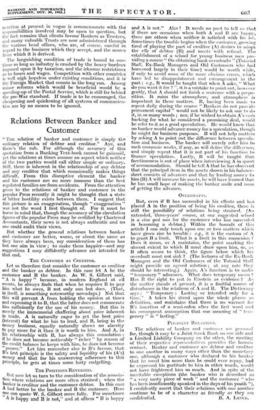THE CUSTOMER AS CREDITOR.
Let us therefore first consider the customer as creditor and the banker as debtor. In this case let A be the customer and B the banker. As W. S. Gilbert said, " A is happy " because, in modern England at all events, he always finds that when he requires B to pay him what he owes, B not only can but does. (That, in itself, is something noteworthy nowadays.) Not that this will prevent A from holding the opinion at times and expressing it to B, that the latter does not remunerate him sufficiently for the use of his money. But this is merely the immemorial chaffering about price inherent in trade. A is naturally eager to get the best price (interest) for what he has to lend, and B, being in the money business, equally naturally shows no alacrity to pay more for it than it is worth to him. And A, in his relationship with 13, has always this consolation : if he does not become noticeably " richer " by reason of the credit balance he keeps with him, he does not become poorer." Let him remember also in B's favour, that B 8 first principle is the safety and liquidity of his (A's) money and that for his unswerving adherence to this Principle, he gets at times some lusty cudgelling.












































 Previous page
Previous page